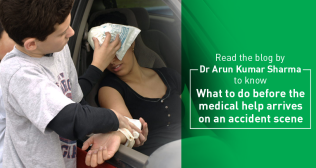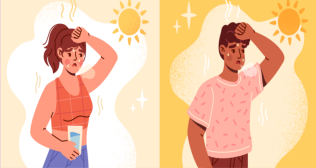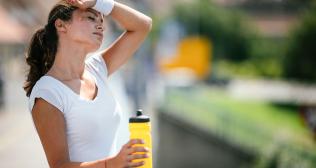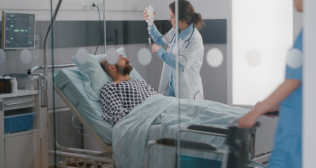
Dos And Don'Ts To Follow During Diwali
Dr Md Nadeem, HOD- Emergency, Fortis Hospital, Vasant Kunj
Diwali is a festival of lights, but can terribly affect our environment and health due to firecrackers. It also comes at a huge cost, considering how it affects our health. Firecracker increases the concentration of dust and pollutants in the air. After use, the dust and pollutants packed with chemicals get settled down in the exposed areas destructing our atmosphere and easily knocking our health at risk. Sulphur dioxide and carbon monoxide enter the body and form sensitive oxygen class which initiate oxidative stress in the lungs. To cope with this, the resistant system of the body organizes immune cells to the lungs, which results in inflammatory responses within the lungs.
As per a World Health Organization study:
- 48% of subjects complained cough
- 38% of subjects complained runny nose and eye irritation
- 27% of subjects complained breathlessness
- 5% of subjects complained allergy and itchy skin
- 2% of subjects complained wheeze which was not present before Diwali
Due to so many harmful chemicals in the air, one can experience the following health problems:
- Breathlessness/ tightness in the chest: Nonstop coughing may be a symbol of throat irritation but attached with breathing trouble can be alarming. An asthma attack that cannot be measured using rescue medicines is a cause of concern
- Solution: People with a history of lung illnesses and respiratory allergies should evade stepping out of home around Diwali. If it cannot be avoided, they must use an N95 mask, which filters out at least 95% of airborne atoms. A normal medical mask is of no use as impurities can pass through it. It is vital to keep inhalers nearby. During this period, regular use of steroidal control drugs is sensible. So, keep an inhaler or nebuliser at hand. Rush to a hospital if you don’t feel well after inhalation. Visit a doctor if signs do not go away even after taking a couple of puffs of rescue drugs.
- Throat, eye and skin irritation: Aluminium and arsenic sulphide that generate colourful sparkles cause skin irritation to some people, especially young children, emerging red rashes on the skin on connection with the chemical. Smokes from burning these may also cause the eyes to turn red and scratchy, and the throat to turn scratchy and sore.
- Solution: Wear full-sleeved cotton garments to protect the skin from contact allergy. If red, itchy rashes appear, shower the skin with water and apply calamine lotion. If skin irritation continues, one can take cetirizine.
- Headache or dizziness: The noise and air pollutants can activate headache and dizziness, particularly in children and pregnant women.
- Solution: Pop a paracetamol to treat the headache. Make sure you remember to drink water and other fluids like lemon juice, coconut water or soups to stay hydrated. If the pain and dizziness are accompanied by nausea, visit a doctor.
- Burns: The crackers can unintentionally cause a burn or wound if not lit sensibly.
- Solution: If the skin hasn’t blistered and the burnt area is not more than 4-5 cm, it can be treated at home. If the burn has instigated in a complex area, like the face, visit a doctor to avoid harmful overcome of event. Hold the burn below running water for 15-20 minutes as it decreases the burning feeling. Don’t use ice as it may harm the skin further. Apply an antibiotic cream; not burnol or toothpaste as they don’t allow wounds to respire. Then, cover the wound with medicated sofratulle gauze.
Do’sPrecautions to take while lighting firecrackers:
- Do’s:
- If there is any burn, dip the burnt part in cold water or by applying garments soaked in cold water
- Remove jewellery and constrictive clothing before bump or blisters occurs
- Protect the area with a dry, germ-free dressing and not cotton or other fleecy material
- Drop, cover and roll if caught fire or cover the person with a blanket immediately
- In case of facial or chest burn, seek instant medical attention
- Don’ts:
- Don’t place a burn under extreme water pressure
- Don’t remove the cloth that is stuck to the burnt area
- Don’t apply butter ointment, oil on the affected area
- Do not put ice as it may reduce wound healing time
- Do not break the blisters
- Avoid long loose clothes, as they are fast in catching fire
- Strictly avoid using matches and lighters for bursting crackers for Diwali as they have open flames that can be dangerous
- Never ignite aerial fireworks like rockets if there is any overhead obstruction present like trees and wires
- Never ever leave a lit match, incense stick or sparkler near unused crackers
- Avoid bursting crackers on the roads as it could cause a major road accident
- Don’t keep your face close to the cracker while trying to light it
- Never give any firework item to small children
- Don’t burn crackers in crowded, congested places, narrow lanes, near sources of fire or inside the house
- Don’t let children burst crackers unaccompanied by an adult. Keep an eye on them constantly















